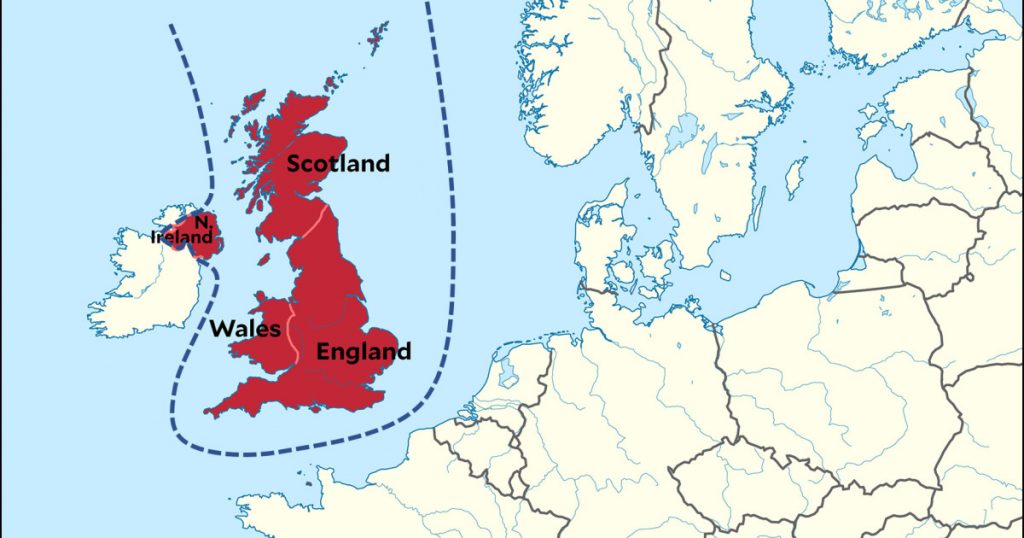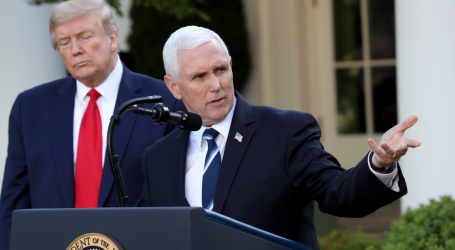Brexit Is About to Get Lit
Looking for news you can trust?Subscribe to our free newsletters.
Hey, remember last weekend’s geography lesson about England vs. Great Britain vs. the United Kingdom? It’s about to come in handy!
As you’ll recall, Northern Ireland is part of the UK, which means that when Brexit is implemented it will be out of the EU just like the rest of the country. The borders of the EU will look like this:
This is a problem. Ireland will now have a hard customs border between the Republic of Ireland and Northern Ireland, something that’s wildly unacceptable to both sides. In fact, the 1995 Good Friday Agreement, which ended a quarter century of violence by squaring the circle of a kinda-sorta-united Irish island but with a sovereign Northern Ireland, was largely based on demilitarizing the border and leaving it completely open. It’s obviously a colossal fudge, but it’s worked well for 20 years, and nobody wants to take a chance on what happens if it goes away.
So what to do? One option is a hazy, soft Brexit with borders that look like this:
The keeps the Irish border open, but it also presents some pretty obvious problems. If there’s no national border with the Republic of Ireland—which belongs to the EU—and no internal border between Northern Ireland and the rest of Britain, then there’s effectively no border between the EU and the UK. An alternative is a soft border down the Irish Sea, but that makes Northern Ireland a sort of second-class country with the UK.
So what to do? Until now, the hazy, muddled soft Brexit option has mostly been on the table, but that’s about to end. Theresa May is laying down the law:
In a speech in Belfast on Friday she is expected to brand the [EU’s] calls for regulatory alignment north and south of the border as a “backstop” solution in the event of no deal as “unworkable”, and repeat her assertion that a border down the Irish Sea is unacceptable to any British prime minister. “The economic and constitutional dislocation of a formal ‘third country’ customs border within our own country is something I will never accept, and I believe no British prime minister could ever accept,” she will say.
So it’s Option #1, with a customs border between Ireland and Northern Ireland. This also means that Northern Ireland won’t be obliged to follow EU regulatory standards, which was one of the whole points of Brexit in the first place. But it’s also something that will increase the legal separation between Ireland and Northern Ireland, and that’s not something the Irish are happy about—especially since the the power-sharing agreement that’s kept Northern Ireland peaceful since 1998 broke down a year ago and shows no signs of repairing itself. Toss in some border troubles, and there’s no telling what might happen.
Nevertheless, the Irish are preparing for the possibility that there will never be a Brexit deal between the UK and the EU, and withdrawal will happen automatically and with no agreements in place:
Ireland’s taoiseach, Leo Varadkar, has expressed concern that the turmoil in the House of Commons suggests a withdrawal agreement would never be supported in Westminster, whatever the outcome of Brexit negotiations. On Wednesday night Varadkar said Ireland was looking to hire about 1,000 officials for customs, veterinary and export checks to cope with a no deal.
As a citizen of a country that elected Donald Trump president, I can hardly act too righteous about national governance right now. But Brexit might well be even stupider than Donald Trump. At least we have a chance of getting rid of him in a couple of years. The British, however, are likely to pay a big price and gain no benefit from Brexit, and it will last forever. Stupid, stupid, stupid.





